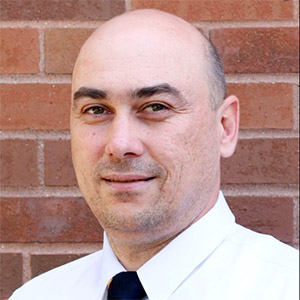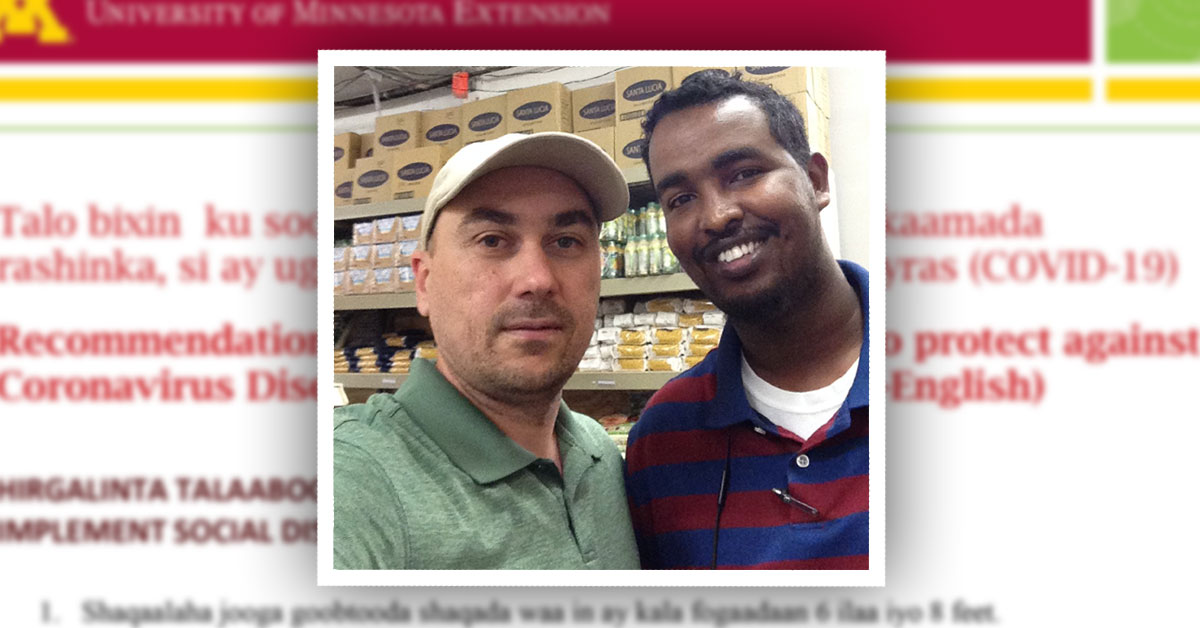The city of St. Cloud is home to many of Minnesota’s Somali immigrants and refugees. Somali grocery stores in the area are an important part of the community where immigrants not only buy ethnic foods and other necessities but also feel safe to gather in a trusted place to socialize and talk about current events — including COVID-19. To help Somali residents better understand the pandemic, the University of Minnesota School of Public Health and Extension partnered to create health information guidelines to be shared with store owners, employees, and shoppers alike.

SPH Professor Alan Lifson and Assistant Extension Professor Serdar Mamedov led the project.
“Grocery stores are more than just places to buy food,” says Lifson. “In a city that has not always been fully welcoming of Somali immigrants, these stores represent an important focal point for their community. Store owners are recognized and respected as important members of the Somali community and take seriously their responsibility to educate and support not only their employees, but others in the community.”
Mamedov, a health and nutrition programs extension educator, learned about the need for Somali-specific COVID-19 information after members of the immigrant community contacted him asking for advice on social distancing and other protective measures.

“For various reasons, some members of the Somali community may not be able to access or relate to public health information presented though such formats as government-sponsored websites,” says Mamedov. “Also, information and recommendations that come from respected leaders and trusted peers within their own community may be seen as the most credible sources of information.”
Mamedov reached out to Lifson for his public health expertise, and together, they developed a handout covering implementing social distance measures, personal protection measures, disinfection of the workplace, and recommendations for employees who are ill. They based the guidelines on recommendations developed by the Minnesota Department of Health (MDH) and the Centers for Disease Control.
The guidelines were written in both English and Somali using easy-to-understand language. The recommendations were designed to be financially feasible and realistic, as well as culturally acceptable and appropriate in a way that would be accepted by the community.
“It was very important that the guidelines take into consideration social and cultural aspects, and be consistent with Somali practices and beliefs,” says Mamedov. “For example, the Prophet of Islam described cleanliness as half of believers’ faith. Therefore, frequently washing the hands and keeping the workplace clean are consistent with Muslim culture. The Prophet also advised the believers to cover their faces when sneezing and that ill people should not visit healthy people.”
Lifson and Mamedov shared a draft of the guidelines with MDH for its feedback and with members of the Somali community for translation and review.
Mamedov says the handout has been well received by the St. Cloud’s Somali community.
“Store owners have told me that it’s perfectly written and it’s nice to be able to help themselves and provide COVID-19 information to customers,” says Mamedov.
The finalized guidelines have been shared with MDH for use in Minnesota’s Somali communities as well.
Lifson thinks the approach used in developing the guidelines provides a good model for creating materials for other ethnic communities.
“It is essential we take into account the needs and culture of the community we’re helping in order for the recommendations to be most relevant, appropriate, and accepted,” says Lifson. “Part of that is you need to be seen as a trusted and dependable partner. This trust is not founded overnight and must be earned by someone who is recognized as a stable and reliable face in the community itself.”
Depending on the community that person could be someone people typically turn to for information and leadership, such as an educator, elected official or religious leader. For Somalis in St. Cloud, add grocery store owners to that list because they not only value selling food to their customers, but their health and safety as well.

